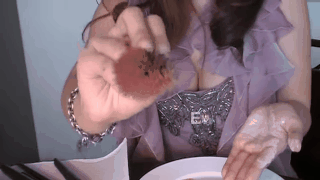 First off: Yes, dirty makeup brushes do, indeed, cause and aggravate acne. Just ask any dermatologist.
First off: Yes, dirty makeup brushes do, indeed, cause and aggravate acne. Just ask any dermatologist.
But while there is broad agreement that brushes should be washed regularly to remove bacteria, there is a lot of conflicting advice about how regularly brushes need to be washed and what is the best way to wash them.
Washing brushes, in addition to being a time-consuming chore, also has become a lot more difficult as cosmetics companies develop products that are meant to last on your skin all day long and can be really tough to remove from brush hair. That’s especially true when you consider that brush hair has a microscopically rough surface structure, regardless of whether the hair is natural or synthetic, and it can sometimes be packed so densely that it’s tough to clean the center-most part of the brush. For example, the Shiseido Perfect Foundation Brush ($30) is a fantastic brush but a total monster to get really clean after you’ve used it once or twice.
Makeup brush hair, which is made up of tiny scales in organic hair or a microscopically rough surface texture in synthetic hair, can accumulate bacteria, oil, dust, and dirt — all of which can aid the growth of even more bacteria, which can, in turn, cause and aggravate skin conditions such as acne.
Anyhow, let’s start with the issue of frequency. How often should you clean your brushes? Heloise says you should wash them “one to two times per month.” Makeup artist and makeup brush seller Sonia Kashuk says once a week. Allure magazine – the Beauty Expert – also says once a week. Some makeup artists suggest once a day. We think it depends on what you’re using the brush for and how sensitive skin is to bacteria. For example, if you use your brush to apply liquid or cream foundation, you should probably clean that brush every day. If it’s a brush you only use for powder blush, and you only use one blush color, maybe you don’t need to clean it as often. No matter what, you definitely do NOT want to be in the 45% of women who never washes their brushes.
It’s not just an issue of removing dirt and bacteria – although that’s certainly the biggest issue – but dirty makeup brushes will also muddy your makeup colors and contaminate your makeup, as the dirt, oil and bacterial mix with makeup in undesirable ways. Also, a dirty brush may not apply makeup that well simply because the previous product is hardened on the brush, which may cause streaking.
 Because deep cleaning brushes with soap and water can be so time consuming, there is now a whole market for “light cleaning” or “spot cleaning” products, which involve wiping product off a brush with a paper towel.
Because deep cleaning brushes with soap and water can be so time consuming, there is now a whole market for “light cleaning” or “spot cleaning” products, which involve wiping product off a brush with a paper towel.
Now, is there a best way or product to clean your makeup brushes? Honestly, it largely depends on what kind of makeup you have caked on them. Whatever way you can get the crud off is worthwhile.
But the most important thing is this: JUST DO IT!
Top Five Brush-Cleaning Videos
We’ve picked our favorite brush-cleaning videos to help you find the best way for you and to inspire you to take action! And while these are our favorite brush-cleaning videos, a few do have some misinformation, which we’ll note where appropriate.
ONE
The late Talia Castellano, known as beauty vlogger TaliaJoy18, shows how she does a light cleaning in-between deep cleaning.
TWO
Beauty vlogger Kandee Johnson shows her method of deep cleaning brushes with olive oil and any soap.
*Now, Kandee says if you get water in the ferrule of your brush that it can rust. This is an old wive’s tail that was probably true a long time ago. But today, virtually all makeup brush ferrules are made of aluminum (most of market) or brass (high end of market). Both of those materials are non-ferrous, which means they do not contain iron and CANNOT rust.
THREE
JuicyStar07 explains the difference between light or spot cleaning and deep cleaning, which she says she does once a week. She endorses Enkore’s makeup brush cleaning technique! (We love Enkore, and highly recommend him. He also ranks as our No. 3 favorite brush-loving guy!)
FOUR
Vlogger Michelle Phan, who says she washes her brushes every day, uses Dawn antibacterial dish soap and olive oil in an artist-y kind of cleaning technique.
*We back Michelle’s advice to not store brushes hair-side up, which just allows dirt and dust to settle on the part of the brush that touches your skin, which is not advisable. We also agree with her that if you allow water to soak into the ferrule, it could damage the glue used in the hair assembly. Brush manufacturers commonly use non-water-soluble epoxy to assemble brushes, which is water-resistant but not waterproof. So if you allow the water to really soak in there, it could loosen the glue. But you’d have to let it really, really soak to have a problem. So, yes, soaking brushes=bad, no matter what you might read on some blogs, where people are soaking their brushes in an effort to speed up brush cleaning.
FIVE
Makeup Geek Marlena, who (seriously!) advises collecting all of these items for a most thorough day of OCD-style brush cleaning: 1.) a bar of soap; 2.) a sponge; 3.) olive oil; 4.) baby shampoo or other liquid soap; 5.) rubbing alcohol; and 6.) clear nail polish.
Even More Information
- http://thebeautydepartment.com/2012/09/how-to-properly-wash-your-brushes/
- http://thebeautydepartment.com/2012/09/how-to-properly-wash-your-brushes/
- http://www.makeup.com/how-to-clean-makeup-tools/
- http://www.mrkate.com/2014/04/30/diy-natural-makeup-brush-cleaner/
- http://www.temptalia.com/use-clean-brushes
- http://health.usnews.com/health-news/articles/2012/07/25/beware-of-these-hidden-causes-of-acne
- http://www.today.com/style/too-big-breakouts-how-beat-adult-acne-535560
